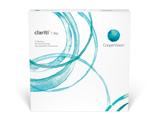
More and more children are getting contact lenses and surprisingly at younger ages. Perhaps this is partially due to studies which have come out showing that contacts can help young people with self-confidence, athletic ability, and academic performance. However, switching from glasses to contact lenses can be difficult and daunting for some children. Here are a few tips to help your child transition to contact lenses.
Go to an eye doctor vs. buying online
Purchasing contacts online may be convenient, but it is not recommended for the first-time contact wearer, especially if she is a child. Many distributors on the Internet are not FDA approved and getting contacts without a prescription can lead to serious problems. Even if you know the power of your child’s glasses, the eye doctor will check the health of her eyes, other factors such as the diameter and base curve, and will walk her through how to insert, take out, and maintain them. Remember, contact lenses are medical devices and should be administered by licensed professionals.
Don’t ditch the glasses completely
When you get contact lenses for your child, it’s not an all-or-nothing switch. Especially in younger children, optometrists will often recommend glasses as a primary method of vision correction with contact lenses being secondary. As your child gets more used to wearing and caring for his contacts, he can slowly start wearing them more regularly.
Opt for daily disposables
According to the AOA, the number one reason why more and more optometrists are willing to fit contact lenses in children is due to daily disposable lenses. This is because daily disposables are very low maintenance. Your child can put in a fresh, new pair every morning without having the responsibility of cleaning and storing them. You might want to consider Proclear 1 day lenses which stay 96% hydrated even after 12 hours of wear–great for those late study nights.
Getting contacts for the first time is a very exciting experience at any age. With a little bit of preparation, you can help make sure your child has a positive experience with contact lenses.





